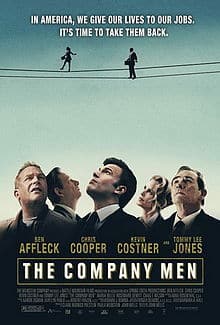Loyalty is For Suckers
Main Cast: Ben Affleck, Tommy Lee Jones, Chris Cooper
Director: John Wells
“Topical” movies can be really tricky. Most topics simply don’t apply to everyone so you have to hit your demographic perfectly to make the film work. Our economic downturn, however, affected such a large segment of the population that is was a pretty good bet for the Weinstein brothers that a movie about spoiled white collar workers losing their jobs would have some appeal. Though not a box office success (grossing about 1/3 of its budget while in theaters), The Company Men does succeed in telling a fairly compelling story.
Writer/director John Wells, who has an impressive resume as an executive producer that includes TV’s ER and The West Wing as well as some outstanding big screen productions including the criminally overlooked The Grey Zone, took on the task of portraying what it’s like for high earning white collar workers to feel the sting of a bad economy. The Company Men focuses not on the classic Wall Street bad guys causing economic crises, but rather those in the upper ranks of a transportation manufacturing company. GTX employs many thousands of people, from the factory to the boardroom. When the economy bottoms out, so do sales. Factories are closed, salesmen cut and the executives who run those divisions become suddenly expendable. It is into this setting that we jump as Bobby Walker (Ben Affleck) is unceremoniously fired from his high paying sales position.
Affleck leads the star studded cast as a man who comes from a relatively modest background and finds most of his self-worth in his ability to make a lot of money. As Bobby flounders arrogantly into the turbulent waters of unemployment he discovers just how average he really is – and how fragile is the world he thought he had built. Finding themselves in similar positions are Phil Woodward (Chris Cooper) who worked his way from the factory floor to the executive suites and Gene McCrary (Tommy Lee Jones) who is not only a long-term employee but one of the company founders.
Along for the ride is Maria Bello as the hired gun who fires people and Kevin Costner as Bobby’s carpenter brother-in-law with whom he has longstanding differences. It would be easy to paint Bello’s character as the bad guy but we get Craig T. Nelson as the CEO fulfilling that role very nicely. The film does not (how can it?) resist taking a shot at the millions of dollars of bonuses the CEOs earn on the backs of their fired employees and Nelson is just the right amount of slimy.
What makes The Company Men interesting is not the situation as much as how each individual copes. Bobby starts as angry and arrogant, only slowly recognizing the tenuous nature of his lifestyle. Phil realizes immediately that everything he worked for can and did go up in a puff of smoke. He just doesn’t know what to do next, besides drink.
Gene, the most financially secure of the three, becomes philosophical and withdrawn as he watches the world he has known for decades become unrecognizable. Each portrays a face of unemployment that we don’t usually see – the executive turned jobless. It turns out that they aren’t so different from anyone else; they just lose bigger houses and faster cars. But unlike Bobby’s carpenter relative they have nothing to point to as accomplishment.
The Company Men looks into each man’s life, but Bobby is the main character and it is he who goes through the most detailed trials and tribulations after he’s fired. Ben Affleck isn’t a bad actor, but he isn’t a great one, either. He plays a decent jerk, which works to his favor for a lot of his scenes. It is to his great good fortune that he’s supported by excellent performances from Cooper and Jones. They take their characters and mold them into people we care for – they are both able to physically convey pain and despair so convincingly that it helps us empathize with the more wooden Affleck who shares their basic circumstances.
Maria Bello doesn’t have a lot to work with but even she thaws as we move through the film. Her job sucks, but she knows exactly what she faces if she leaves. Kevin Costner is Kevin Costner. He’s personable but irritating and fits his
role well. His part is relatively small and I’m glad – any more of him would be tiresome – but he’s important to the success of the film. We may feel something for Bobby as his lifestyle slips away and he feels like a failure, but it’s from Costner’s character that we regain perspective on how a bad economy affects people who never belonged to a country club or drove a Porsche.
Also of note is the brilliant cinematography of Roger Deakins. The cavernously empty shipyard representing the lost American industrial dream is beautifully realized as is the sterile corporate world and the cold and uncaring “outplacement” services provided to the newly unemployed. There is a lot of compare and contrast in this film, done with characterization, situation and visuals. Wells does a good job of bringing is all together into a cohesive whole without making it a simple sermon about the evils of corporate politics.
Overall, 4 stars for The Company Men. Some outstanding supporting performances bolster an adequate Affleck to give this topical drama enough heft to make a point without getting lost in pathos or politics.
photos by Erin Lassahn and TomDog

Sue reads a lot, writes a lot, edits a lot, and loves a good craft. She was deemed “too picky” to proofread her children’s school papers and wears this as a badge of honor. She is also proud of her aggressively average knitting skills She is the Editorial Director at Silver Beacon Marketing and an aspiring Crazy Cat Lady.









Leave a Reply